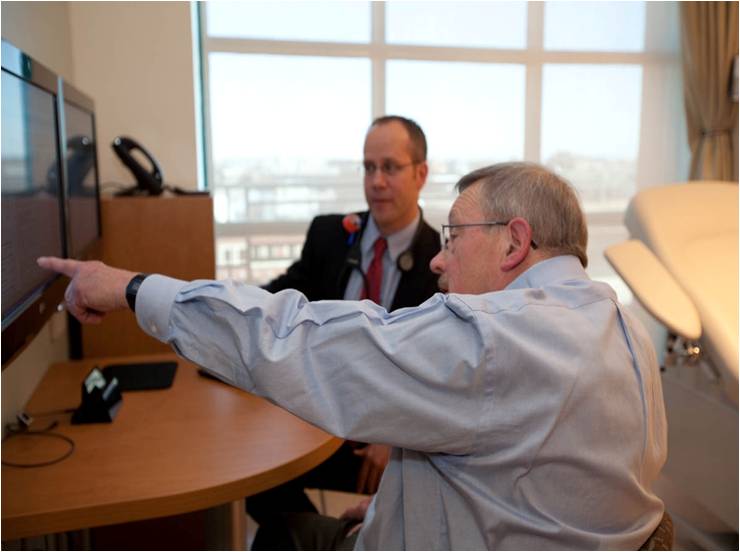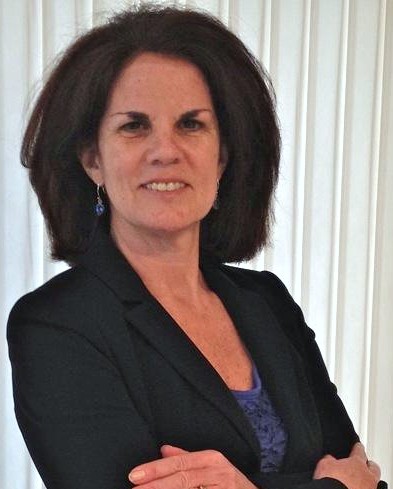
More than two years ago, Mass General launched their Ambulatory Practice of the Future, an innovative primary care clinic for employees and adult dependents. Developed as a Patient-Centered Medical home and ACO, today they support 3,000 enrolled patients with three doctors and two nurse practitioners.
This innovative practice was designed for and with patients for a better patient experience. Their experience begins with the initial greeting and extends through ongoing care interactions. There is a strong focus on patient education and empowerment. The care team collaborates to support each patient both in person and online. One of the goals of the practice is to reach patients where they are both physically and with their health.
Designed to Support Shared Decision Making
Once patients enter the welcoming and intimate care setting at The Ambulatory Practice of the Future (APF), they are ready to collaborate with their clinician. Sitting side by side, they review the medical record together and begin the discussion with health goals.
“We actually added a data field to the record called ‘Health and Life Balance Plan’ where we document mutually agreed upon goal(s) for the coming weeks and months and then it is easily reviewed by the patient via their portal after the visit and in preparation for upcoming follow- up encounters”, explains Dr David Judge, Medical Director, Ambulatory Practice of the Future, Massachusetts General Hospital.
This collaborative approach has helped patients who have not historically been able to get engaged around a goal. Dr Judge shares a story about a 54 year old woman with diabetes who was reluctant to discuss next steps in management due to her fear of taking insulin. After allowing her to shape the goals with a focus on other areas of lifestyle management initially, coaching to realize some success and encouraging patience with the process, she has recently decided to proceed with insulin therapy.
Patient Engagement Tools
APF uses shared decision making videos developed by the Foundation for Informed Medical Decision Making to educate patients about screening tests and in managing specific medical issues such as prostate cancer.
Between their visits, patients can access the portal to view their medical information and communicate securely with their clinician. Although the care team can access the EMR from their mobile devices, APF expects that patients will be able to access their portal and records via mobile devices in the near future.
Patients can currently participate in an online visit with their care team. Dr Judge describes one of the complex patients that they monitor closely with frequent virtual visits. “Mr. K is struggling with end stage renal failure, congestive heart failure and it has become difficult for him to come for office visits. Between scheduled virtual visits, emails from the patient and his wife and monitoring by visiting RNs, we are able to manage his needs fairly well with rare office visits. We are on the verge of implementing true remote monitoring technologies but currently the patient or RN need to report the measures (i.e. blood pressure, weight, blood sugar, PHQ 9 depression score, etc.).”
On the prevention side, several employees are using mobile apps to track their daily lifestyle choices regarding exercise and nutrition and sharing the information with their clinicians during their visits.
Future Path to Patient Engagement
During my panel at the recent Shared Decision Making Conference, Dr Judge spoke about some exciting new ways APF will be leveraging technology to engage their patients.
“We will be piloting the concept of 'apprenticeship' in which patients go through a more formal education process with coaching and demonstration of increased knowledge and skill to push the boundary on self management. We are developing programs tailored to specific medical conditions (i.e. HTN, DM and Depression). Goal setting for each patient helps the team to understand how to customize the program and to identify what specific barriers may be preventing success.”
“As we have done with diabetes, we expect that patients will learn not only to change their lifestyle and make healthier choices but also adjust medication in the management of multiple chronic diseases. The care team will be able to monitor and assist but patients will truly drive their own care more effectively from day to day”, adds Dr Judge.
APF is starting a pilot soon using a mobile tablet that “allows very easy synchronous communication to transmit monitored blood pressure and to enable the patient and team to collaborate around lifestyle management and medication adjustment”.
The term “apprenticeship” is being used by Dr. John Moore at MIT Media Lab. Dr Judge explains, “I think it appropriately describes the next step in the evolution of making shared decisions with patients. Beyond that is potentially a mastery of health and the potential for patient - to - patient support to grow. We are hoping to launch both face- to -face and virtual peer to peer interactions in the near future.”
 care collaboration,
care collaboration,  educating consumers about health and wellness,
educating consumers about health and wellness,  self- management health tools in
self- management health tools in  Behavior Change Health & Wellness,
Behavior Change Health & Wellness,  Data Driven Health Engagement,
Data Driven Health Engagement,  Decision Support eHealth,
Decision Support eHealth,  Patient Centered Medical Home,
Patient Centered Medical Home,  Patient Decision Support,
Patient Decision Support,  Patient Engagement,
Patient Engagement,  Patient Portal,
Patient Portal,  Personalization eHealth,
Personalization eHealth,  shared decision making ehealth
shared decision making ehealth 



Reader Comments